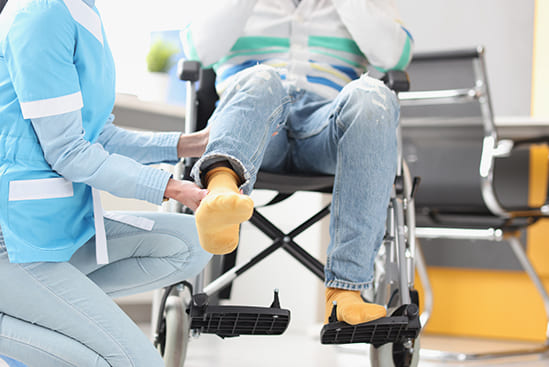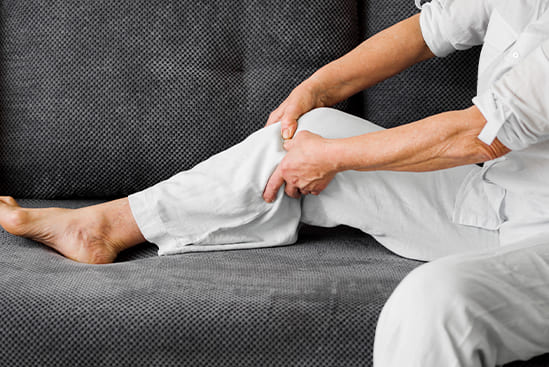
Sports Injuries, Synapse Physiotherapy
Sports Physiotherapy: Treatment for Muscle Strains
Muscle strains are one of the most common injuries experienced by athletes and physically active individuals. These injuries occur when muscle fibers are overstretched or torn, often leading to pain, swelling, and reduced mobility. While muscle strains can vary in severity, proper treatment is essential to ensure a full recovery and to prevent future injuries. Sports physiotherapy provides a comprehensive approach to healing and rehabilitation, making it an effective solution for muscle strain recovery.
What is muscle strain?
A muscle strain, often referred to as a pulled muscle, is similar to a ligament sprain. It occurs when muscle fibers are overstressed and unable to withstand the demands placed on them, leading to fiber tears. This injury typically results from excessive mechanical stress, such as a forceful eccentric contraction or overstretching. Non-contact, high-intensity activities like sprinting and jumping are common causes of muscle strains.
Signs of a Muscle Strain
Key symptoms of a muscle strain include:
- Swelling, discoloration, or redness at the injury site
- Pain even during rest
- Difficulty or inability to use the affected muscle
- Weakness in the muscle or surrounding tendons
Causes
Acute strains usually occur due to a single event, such as improper lifting techniques or sudden overexertion. Chronic strains, however, develop gradually from repetitive movements that place ongoing stress on a muscle.
Risk Factors
Certain sports and activities can increase the risk of muscle strains:
- Contact Sports: Sports like football, soccer, hockey, wrestling, and boxing can lead to higher injury risks.
- Vulnerable Areas:
- Legs and Ankles: Activities involving rapid starts, stops, and jumping, such as basketball and hurdling, can strain the Achilles tendon.
- Hands: Repetitive gripping in sports like golf or gymnastics may strain hand muscles.
- Elbows: Sports involving throwing or racket use, such as tennis or baseball, often result in elbow strains.
Recognizing the symptoms and understanding the causes and risk factors can help manage and prevent muscle strains effectively.
How Physiotherapy Helps with Muscle Strains
Physiotherapy is highly effective in managing and recovering from muscle strains. It focuses on relieving pain and swelling during the initial stages of the injury and gradually restoring the muscle’s strength, flexibility, and function. With personalized treatments that include exercises, stretching, and manual therapy, physiotherapy not only promotes healing but also minimizes the risk of future injuries by addressing imbalances and improving overall muscle stability and flexibility. Here’s a detailed breakdown of the key components of physiotherapy for muscle strains:
1. Comprehensive Assessment and Evaluation
A physiotherapist conducts a thorough evaluation to determine the severity of the strain and identify the specific muscle group involved. This assessment helps in designing a treatment plan tailored to your needs and recovery goals. Factors like age, activity level, and the nature of the injury are also considered
2. Pain and Inflammation Management
During the early stages of a muscle strain, reducing pain and swelling is a priority. Physiotherapists use various techniques, including:
- Ice and Heat Therapy: Ice reduces inflammation and numbs pain, while heat relaxes tight muscles and improves blood flow to the area.
- Ultrasound Therapy: High-frequency sound waves stimulate tissue repair and reduce deep-seated pain.
- Electrical Stimulation: Devices like TENS (Transcutaneous Electrical Nerve Stimulation) provide pain relief and promote muscle activation.
3. Restoring Range of Motion (ROM)
Muscle strains often lead to stiffness and restricted movement. Gentle range-of-motion exercises are introduced early in rehabilitation to maintain joint mobility and prevent stiffness. These movements are progressively increased as healing occurs to ensure the affected muscle regains its natural flexibility.
4. Gradual Strengthening
To rebuild the injured muscle’s strength, physiotherapists incorporate progressive resistance exercises. These start with light, controlled movements and gradually advance to more demanding exercises. Strengthening helps the muscle withstand daily activities and physical demands without reinjury.
5. Targeted Stretching
Tightness in the injured muscle can hinder recovery and increase the risk of future strains. Specific stretches are introduced to lengthen the muscle fibers, enhance flexibility, and improve the overall function of the muscle-tendon unit.
6. Proprioceptive Training
Proprioception refers to your body’s ability to sense movement, position, and balance. Following a muscle strain, this sense can be impaired, increasing the risk of re-injury. Proprioceptive exercises, such as balance drills and coordination activities, help restore this critical function and improve muscle control.
7. Gradual Return to Activity
A critical aspect of physiotherapy is ensuring a safe and progressive return to daily activities and sports. Physiotherapists guide patients through exercises and functional movements tailored to their specific activity goals. This phase ensures the muscle can handle increased demands without strain or re-injury
Preventing Muscle Strains with Physiotherapy
In addition to treating existing injuries, sports physiotherapy is a vital tool for preventing muscle strains. At Synapse Physiotherapy, our skilled physiotherapists focus on educating patients about proper warm-up techniques, correct body mechanics, and targeted exercises designed to strengthen muscles and enhance flexibility. This proactive approach not only reduces the risk of future injuries but also improves overall athletic performance, enabling you to push your limits safely and effectively.
When to See a Physiotherapist
If you’ve suffered a muscle strain that isn’t improving with rest or continues to cause discomfort, it’s time to consult the experts at Synapse Physiotherapy. Our team specializes in early intervention to accelerate healing, prevent further damage, and minimize the risk of long-term complications. By addressing your unique needs, we help you return to your activities stronger and more confident.
Conclusion
Sports physiotherapy, especially at Synapse Physiotherapy, is a proven method for managing muscle strains. Combining pain relief, mobility restoration, and preventative care, our treatments are tailored to meet the demands of athletes and active individuals alike. Whether you’re a professional competitor or simply enjoy staying fit, we’re here to help you recover quickly and achieve your full potential. Don’t let a muscle strain slow you down—visit Synapse Physiotherapy today and reclaim your strength, flexibility, and performance!
.
Tags :

Back & Neck Pain
Conditions such as stiffness, postural abnormalities and muscle overuse from prolonged desk work at the office or home is more prevalent than most would think. We provide the necessary tools to fix you up and educate you on ergonomics which can unload unnecessary stress.
- Spine & Core Rehabilitation
- Strength & Conditioning Programme
- Pain Management
- Biomechanical Assessment
- Sports Physiotherapy
- Group Class

Sports Injuries
Rolled ankles, jarred knees, impinged shoulders are few conditions in the plethora of sports injuries which can hamper performance and limit our enjoyment of sports. Physiotherapy not only treats the symptoms of these conditions but propels your overall fitness to greater heights.
- Strength & Conditioning Programme
- Pain Management
- Biomechanical Assessment
- Sports Physiotherapy
- Shockwave Therapy
- Group Class

Work Desk Injuries
Conditions such as stiffness, postural abnormalities and muscle overuse from prolonged desk work at the office or home is more prevalent than most would think. We provide the necessary tools to fix you up and educate you on ergonomics which can unload unnecessary stress.

Pre-Post-Surgical Conditions
Surgery involves going through preparation both before and after. Physiotherapists play a vital role in getting your body ready for surgeries with circulatory, breathing and strengthening exercises. After the procedure, let us be there for your recovery and rehabilitation, taking it one step at a time.

Scoliosis & Postural Abnormalities
The way we stand, sit, walk and sleep has influence over our posture and the overall balance of muscles controlling its alignment. A comprehensive screening can be done by our physiotherapists to detect abnormalities, which we will aid in correcting.

Neurological Conditions
Neurological disabilities such as stroke, nerve compression and neuropathies can be barriers for patients to live life to its fullest. We at Synapse are committed to help you overcome these hurdles by ensuring functional mobility and quality of life is at its optimum by providing the right treatment and exercises.

Osteoarthritis & Rheumatism
Joint degeneration and inflammation happens as the human body grows older, but that does not mean our way of life degenerates as well. Relief your joint pains with a joint effort together with your physiotherapist, who will provide pain-relief treatments and prescribe exercises for your wellbeing.

Conditions Relating To Elderly
Common conditions in the older age population include hips & knee pain, back & neck pain, osteoarthritis, rheumatism, fear of falling and many more. Aging and degeneration of bodily function is inevitable, but here at Synapse, we will help you live the best of your life.

Home Physiotherapy
We understand that some conditions or injuries can make it difficult to receive rehabilitation at our clinic be it mobility or transportation issues. Our objective is to provide you with the same high-quality physiotherapy services at home that you would receive in-clinic.
